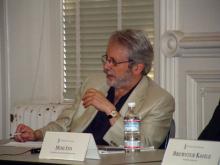
What Is It
Is there a right and a wrong way to speak English? Is there really something wrong with saying, "Hopefully, we'll have a good century," or "Where is the library at?" or "There is no way to correctly split an infinitive"? Is grammatical purity just snobbism? John and Ken don't hold their tongues with linguist and NPR commentator Geoff Nunberg.
Listening Notes
Is there a correct way to speak English? Does standard English have a privileged place in the US? Ken gives an anecdotal definition of a “language” as a dialect with a navy. Who decides what is proper English? Ken introduces the guest, Geoffrey Nunberg, senior researcher at CSLI at Stanford. Is there a “standard” language? Nunberg says there is but that it is changing all the time. John explains that performatives are words like “promise” that perform some action and that performatives were one time used to explain why “hopefully” could be used at the start of a sentence.
Are there class distinctions in American English? Nunberg says there are, such as the double negative being seen as bad. Nunberg says that a lot of criticisms of non-standard English are criticisms of the people that use it. Nunberg says that there are a variety of dialects in English that are appropriate and inappropriate in different contexts. Chomsky thinks that there are no languages, there are just idiolects in a speaker's head. Ken says that most linguists he knows are nativists, that is, they think there is a universal grammar in the speaker's head that has different parameters set for different languages.
If languages are created by parameters set in our heads, where do norms of language come from? Nunberg says that to understand the norms, you have to look at the social aspect of language. Is it possible that as English becomes a second language for people all over the world that English will break free of American or British usage? Nunberg says that it is already happening in Europe. Are the norms of language like the norms of logic? Ken thinks there that the difference is that the norms of logic deal with truth while the norms of language do not.
- Roving Philosophical Report (Seek to 04:25): Amy Standen goes to Horace Mann Middle School in Oakland to see how young children speak.
- Sixty Second Philosopher (Seek to 36:55): Ian Shoales gives the run down on Noam Chomsky's contributions to linguistics.
- Conundrum (Seek to 48:10): Travis from Menlo Park, CA calls in to ask whether he can ethically support his favorite team and its star player after finding out that the star player has taken performance enhancing substances.



